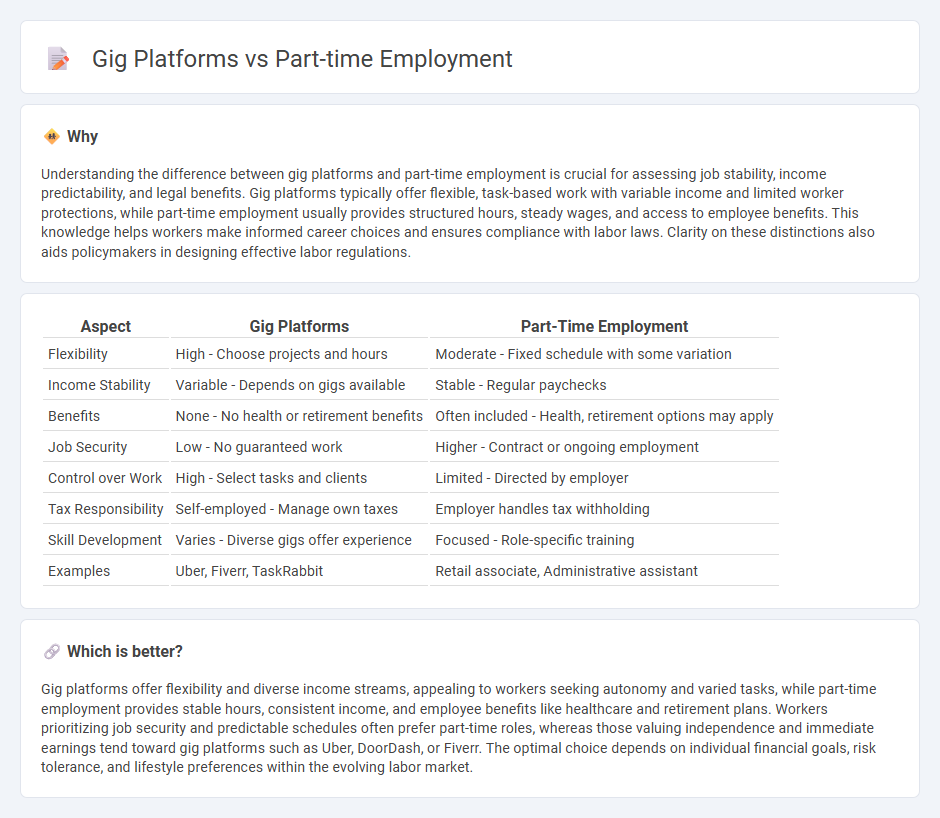
Gig platforms offer flexible opportunities for freelancers to find short-term projects across industries like graphic design, writing, and ride-sharing, harnessing technology to connect talent with demand. Part-time employment provides stable hours and benefits within traditional workplaces, catering to those seeking consistent income without full-time commitments. Explore how choosing between gig platforms and part-time jobs can shape your work-life balance and financial goals.
Why it is important
Understanding the difference between gig platforms and part-time employment is crucial for assessing job stability, income predictability, and legal benefits. Gig platforms typically offer flexible, task-based work with variable income and limited worker protections, while part-time employment usually provides structured hours, steady wages, and access to employee benefits. This knowledge helps workers make informed career choices and ensures compliance with labor laws. Clarity on these distinctions also aids policymakers in designing effective labor regulations.
Comparison Table
| Aspect | Gig Platforms | Part-Time Employment |
|---|---|---|
| Flexibility | High - Choose projects and hours | Moderate - Fixed schedule with some variation |
| Income Stability | Variable - Depends on gigs available | Stable - Regular paychecks |
| Benefits | None - No health or retirement benefits | Often included - Health, retirement options may apply |
| Job Security | Low - No guaranteed work | Higher - Contract or ongoing employment |
| Control over Work | High - Select tasks and clients | Limited - Directed by employer |
| Tax Responsibility | Self-employed - Manage own taxes | Employer handles tax withholding |
| Skill Development | Varies - Diverse gigs offer experience | Focused - Role-specific training |
| Examples | Uber, Fiverr, TaskRabbit | Retail associate, Administrative assistant |
Which is better?
Gig platforms offer flexibility and diverse income streams, appealing to workers seeking autonomy and varied tasks, while part-time employment provides stable hours, consistent income, and employee benefits like healthcare and retirement plans. Workers prioritizing job security and predictable schedules often prefer part-time roles, whereas those valuing independence and immediate earnings tend toward gig platforms such as Uber, DoorDash, or Fiverr. The optimal choice depends on individual financial goals, risk tolerance, and lifestyle preferences within the evolving labor market.
Connection
Gig platforms have revolutionized part-time employment by offering flexible job opportunities through digital marketplaces like Uber, TaskRabbit, and Fiverr. These platforms connect workers with short-term, project-based tasks, enabling individuals to supplement income and manage their work-life balance effectively. The rise of gig platforms directly correlates with increased part-time employment rates, reshaping the labor market's structure.
Key Terms
Flexibility
Part-time employment typically offers structured hours with moderate flexibility, allowing workers to maintain a consistent schedule. Gig platforms provide unparalleled flexibility, enabling individuals to choose when and how much they work, often appealing to those seeking variable or unpredictable availability. Explore more insights on balancing flexibility with job security in part-time and gig economy roles.
Job security
Part-time employment generally offers greater job security through consistent hours, employer benefits, and legal protections compared to gig platforms, which often lack stability and standard labor safeguards. Gig economy workers face unpredictable income streams and typically do not receive health insurance, paid leave, or retirement plans. Explore more to understand how job security varies between these work arrangements and what it means for your financial stability.
Benefits
Part-time employment offers benefits such as predictable income, employer-provided healthcare, and retirement plans, ensuring stable financial security. Gig platforms provide flexibility, autonomy, and opportunities to diversify earnings across multiple tasks or projects. Explore more to understand which option aligns best with your lifestyle and career goals.
Source and External Links
Understanding Part-Time Jobs: Definition, Benefits, and Opportunities - A part-time job is defined as working fewer than 30 hours per week, offering flexibility, work-life balance, and additional income but often with limited benefits and career advancement opportunities.
Part Time Jobs in Slidell, LA (NOW HIRING) - ZipRecruiter - Part-time jobs generally involve shifts of 20-30 hours a week, common in industries like retail and food service, and can lead to full-time roles after proving reliability.
Part-Time vs Full-Time: How Many Hours & How to Classify? - Part-time employment usually consists of 1 to 34 hours per week with pay and benefits often prorated compared to full-time employees, but policies vary by employer.
 dowidth.com
dowidth.com